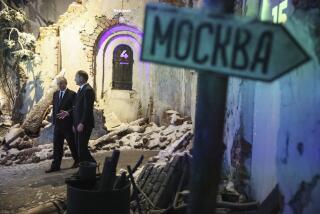Disaster Seen Hurting Gorbachev Arms Clout : Chernobyl Handling May Put Soviets at a Disadvantage in Talks
- Share via
WASHINGTON — As U.S.-Soviet nuclear arms talks resume in Geneva today, the Chernobyl nuclear reactor catastrophe has dealt a severe blow to Soviet leader Mikhail S. Gorbachev’s capacity to influence arms issues, U.S. and European officials said this week.
So weakened is Gorbachev’s position on arms control that two senior Administration officials speculated that the Soviets might try to deflect world criticism of their handling of the Chernobyl accident by advancing a new arms proposal or by speeding up an offer that had been prepared for later unveiling.
But West Europeans have already begun to dismiss Gorbachev’s sweeping arms control pronouncements because, in the Europeans’ view, the statements have not led to serious negotiations at Geneva, another U.S. official said. And “Chernobyl makes his selling job all the harder,” the official added.
Allies in the Lurch
“Some of the public relations smile has been wiped off Gorbachev’s face,” a senior West German official said in Bonn. “He has left East European allies and would-be West European friends in the lurch with the delay in making public what happened at the nuclear plant.”
The long Soviet silence about the accident “will also tend to strengthen sharply the need for verifying any new arms agreement,” a U.S. official said, “and this should produce greater sympathy and support in Europe for our position.”
“Chernobyl showed we were not being unreasonable in our approach to Moscow on arms issues,” he added, “and it erodes the credibility of statements by Gorbachev and other Soviet leaders on arms control.”
The U.S. and European officials all spoke on condition they not be identified.
Many West German editorialists echoed this view as the resumption of arms talks drew near. The independent-conservative Berliner Morgenpost wrote: “Moscow’s information policy is downright grotesque and dangerous. Here we do not find the new spirit of Mikhail Gorbachev (with its watchword, openness) at work.”
On the other hand, world anxiety about nuclear weapons is likely to increase as the radiation toll from the Soviet disaster grows, and this is likely to re-awaken public demands for greater activism to curb nuclear arms as well as power plants.
“Chernobyl will surely re-energize the anti-nuclear peace movement, which--as background to the arms talks in Geneva--will be a Soviet asset,” said Jeremy Azrael, a former CIA analyst on Soviet affairs who is now at the Rand Corp.
Europeans, however, do not see it quite this way. They distinguish between nuclear-weapons protesters and nuclear-electricity protesters; the two groups usually have resisted unification efforts despite their hostility to different aspects of nuclear energy.
Thus many European analysts expect Chernobyl to give a big impetus only to the anti-nuclear-power movement, which is strong in West Germany and Britain as well as in some areas of the United States.
Summit Movement
Some diplomats in Bonn, particularly Americans, hope that Gorbachev will recover his poise--if only to see another summit meeting with President Reagan this year and some positive movement in the Geneva arms control talks.
Moscow already has sought to turn attention from the reactor meltdown and fallout contamination by citing its proposals for a nuclear weapon test ban and arms control, even to blaming the West for the impasse at Geneva.
“This Chernobyl accident was taken as a pretext to avoid any serious talks on arms control and disarmament,” said Georgy A. Arbatov, a well-known Soviet propagandist.
Because of Chernobyl, Moscow should have a greater interest in a U.S.-Soviet summit and in some significant arms control results from it, a senior Administration official said in Washington. If so, the topic most amenable to an early agreement, in his view, is that of intermediate-range nuclear forces in Europe, where the fewest issues divide the two sides.
Aggressive Posture
In Geneva, rather than giving any hint of being more forthcoming, Soviet chief delegate Viktor P. Karpov seemed to go out of his way to be aggressive in his arrival statement Tuesday. He maintained that there has been “no real progress” at the talks, despite some closing of gaps on intermediate-range nuclear forces, and he implicitly criticized last month’s U.S. air strike against Libya even while denying “linkage” between arms control and other differences between the superpowers.
U.S. Ambassador Max M. Kampelman, on his arrival there, expressed “disappointment” with Karpov’s statement and heatedly rejected Karpov’s “feigned outrage” about Libya by citing Soviet support for Col. Moammar Kadafi and the 120,000-man Soviet invasion force in Afghanistan.
A senior Administration official in Washington noted that, in the past, the Soviets have sometimes offered the most significant concessions in talks that were preceded by aggressive arrival statements of this kind, but he also said that the Soviets have a tendency to withdraw turtle-like into a shell after an embarrassing event rather than make greater overtures toward accommodation.
Robert C. Toth reported from Washington and William Tuohy from Bonn.
More to Read
Sign up for Essential California
The most important California stories and recommendations in your inbox every morning.
You may occasionally receive promotional content from the Los Angeles Times.













